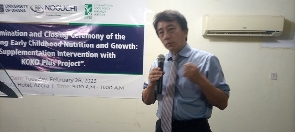A dissemination and closing ceremony on the supplementation trial of KokoPlus among HIV-exposed children has been launched in Accra.
The project conducted by the Noguchi Memorial Institute for Medical Research (NMIMR) in collaboration with the International Food Policy Research Institute (IFPRI) aimed to urgently improve nutrition intake and growth among young children.
Categorized into Community intervention and impact evaluation and a randomised control trial to assess the impact of KokoPlus supplementation on nutrition and development of HIV-exposed children. the project involved the distribution of a nutrition supplement called KokoPlus, to families with children aged between 6 to 24 months in transition from breastfeeding to complementary/solid food.
The overall aim of the research was to conduct a randomised controlled trial of KokoPlus in young HIV-exposed children attending HIV clinics in Accra, to test the effectiveness of KokoPlus to improve nutritional status and child development in children born to parents living with HIV.
The project followed a randomised control trial to measure the impact of supplementing the diet of HIV-exposed children with the nutrition supplement to determine its impact on their growth and nutritional status.
The project to introduce Kokoplus was also aimed at urgently improving nutrition intake and growth among children in refugee hosting communities in Ghana, especially those from food-insecure homes to address the threat of malnutrition.
Undertaken within a year from November 2020 – November 2021, the project focused on communities in the Western, Central and Bono Regions in various communities including Ampain in the Ellembelle district, Egyeikrom in the Komenda-Edina Eguafo district and Fatentaa in the Brekum West district.
The results were the outcome of the intensive planning, training, implementation and monitoring undertaken by the Nutrition Department of the Family Health Division of the Ghana Health Service together with the respective regional Nutrition officers who led the implementation of the interventions.
The product was mixed in meals such as rice, stews, soup and sauces, banku, rice balls, TZ, fufu, ‘mpotompoto’ and various porridges (Hausa koko, fermented corn, tom brown, rice pudding, etc.)
It was discovered that the product positively impacted the growth of the children as they readily accepted it, while others preferred consuming the KokoPlus in its raw form.
Explaining the values of the product in an extensive interview, Project lead Dr. Futoshi Yamauchi who is also Senior Research Fellow, Markets, Trades and Institutions at the International Food Policy Research Institute said the first 1000 days of a child’s life were crucial to its development.
“The first 1000 days for every kid is very important so when they are malnourished in the 1000 days, that’s about two and a half years of their early life, it affects their development, and learning ability,” said Dr. Futoshi Yamauchi.
According to him, the project which introduces supplementation achieved a positive and significant impact on the haemoglobin of the young beneficiaries. “The study showed positive long-term impact of Kokoplus on child development,” Dr. Futoshi said.
The Senior Research Fellow expressed satisfaction at the outcome of the project including feedback from the mothers of the beneficiaries to the Kokoplus foundation, noting that the producers of the product were considering utilizing it in older school children.
Dr. Gloria Folson, Project lead and Research fellow, Department of Nutrition, Noguchi Memorial Institute for Medical Research who led and served as principal investigators, conducted in-depth research into the project.
She said though there are many nutrient supplements on the market for children, they lacked the necessary nutrients required to address the nutritional needs of the children, hence the need to introduce the new product which has been fortified with all the required nutrients.
Dr. Folson said, “We have a vulnerable group, they’re vulnerable because of HIV exposure, they’re vulnerable because of their age, they’re vulnerable because of foods that are commonly fed to them so why don’t we introduce this supplement to see how it’ll help to sustain good nutritional status.”
She urged nursing mothers to collaborate with their health service providers for the necessary assistance regarding the nutrition of their children.
One of the nursing mothers who partook in the project, Miss Gifty Narh, a resident of Dansoman in Accra said the product had a healthy impact on her child. According to her, her son who before taking the product weighed less than required gained significant weight a few months after taking the product.
Health News of Saturday, 11 March 2023
Source: Michael Oberteye
Supplementation intervention to improve early childhood nutrition and HIV-exposed children launched
Entertainment












